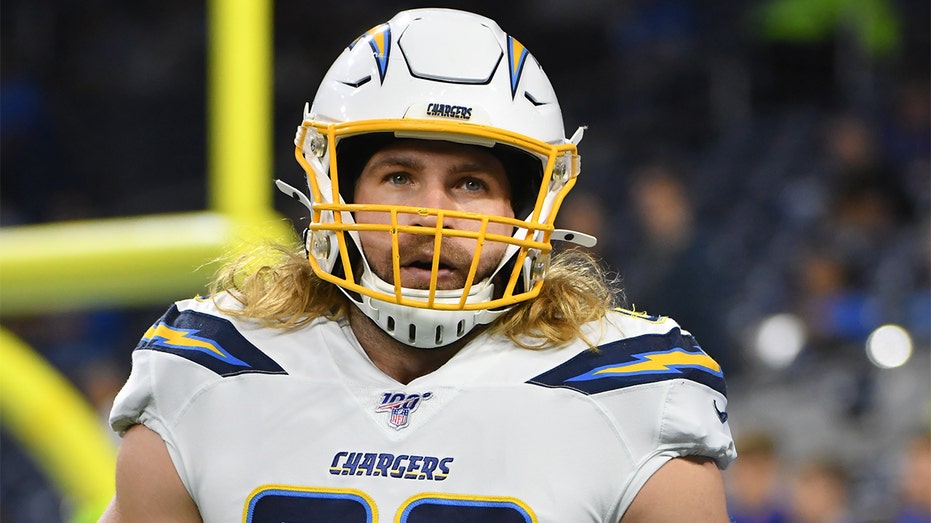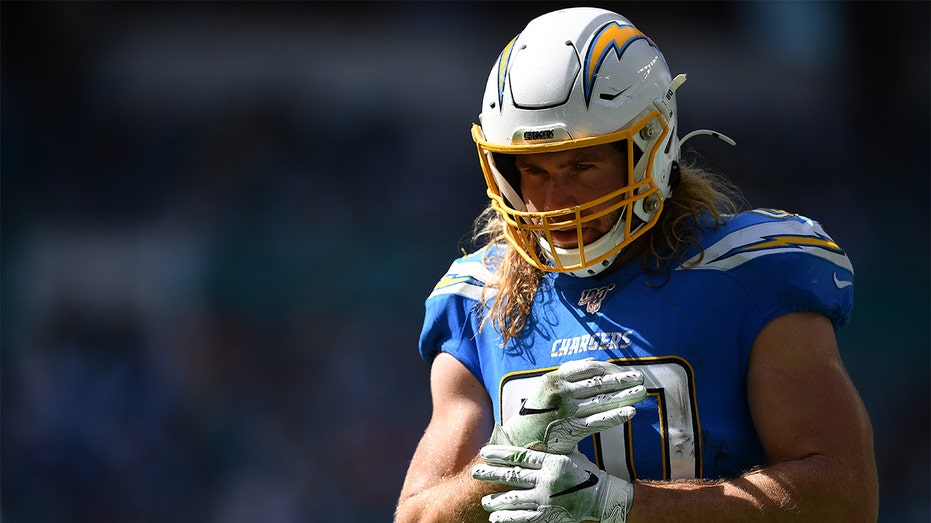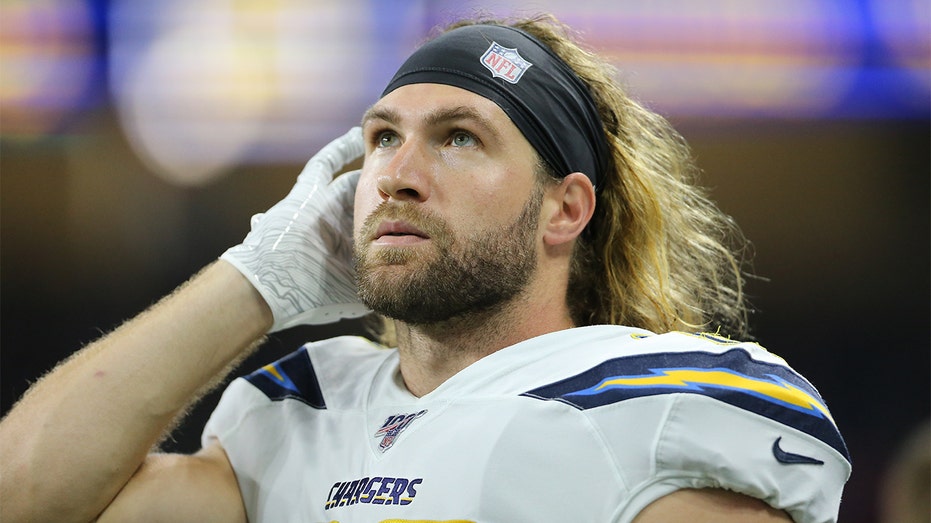Why NFL's Sean Culkin is encouraging pro athletes to bank on Bitcoin, cryptocurrency
The self-proclaimed 'market nerd' spoke exclusively to FOX Business about being a cryptocurrency fan
Chiefs player who converted entire salary to bitcoin 'OK' with volatility of crypto
Kansas City Chiefs tight end Sean Culkin discusses converting his full salary into bitcoin.
Kansas City Chiefs tight end Sean Culkin, who recently announced to the world he’s converting his 2021 salary into Bitcoin, is now leading the NFL as the expert on cryptocurrency.
"I’ve been getting a lot of questions about crypto privately from guys in the league, and we’re seeing more and more teams and players getting involved," he told FOX Business. "It wasn’t that long ago that only a few of us knew what it was all about. But players understand firsthand that fiat currency depreciates over time, and they tend to grasp the concept of Bitcoin as a store of value right away."
The millennial pro athlete, who has a degree in finance and is working on an MBA, said he doesn’t feel payment in cryptocurrency is risky at all.
"Bitcoin is sound money — meaning it can transfer its value across time and space. It is a monetary network that allows individuals to be their own bank and protect their savings from the inflationary environment the world operates in today."
He said that Bitcoin today is comparable to gold in generations past.
"Gold is valuable because individuals deem it so. A big reason for that is due to its scarcity when considering its high stock-to-flow ratio — a reflection of its current stock and how much issuance occurs each year. As the price of gold rises, miners are incentivized to increase production output, resulting in supply exceeding demand and lowering its price. It’s also very hard to verify the total supply of gold."
The 27-year-old tight end said finance in the future won't be grounded on actual reality but will live mostly in the digital realm.

Los Angeles Chargers tight end Sean Culkin on Sunday Sept.15, 2019 at Ford Field in Detroit, Michigan. (Getty Images)
"Bitcoin has similar properties, except that its algorithm is very transparent about the current supply, and how much is to be mined. Right now, Bitcoin’s stock is about 18.7 million, with a maximum supply of 21 million to be mined over time. As the price rises and miners are incentivized to produce more, it becomes harder to do so over time due to the system’s halving process, which occurs every four years. Each halving cycle means miners have to work twice as hard to produce the same amount of Bitcoin. Bitcoin is inflationary resistant. It also offers more utility and scalability than gold due to its technological properties — value can be transferred anywhere with Bitcoin without the friction that comes with gold — transportation, security, time. Bitcoin is digital gold that is more conducive to future generations’ use of technology."
Culkin said he is looking to build generational wealth for the future of his family.
"In recent years, if you denominate the S&P500 by the Fed’s balance sheet, the chart is flat. And that can be said for other asset classes. Most assets are offering negative real yields right now, and if they are appreciating, you have to ask yourself if the underlying asset is accreting or is the denominator just being debased. Bitcoin, and other digital assets are outperforming the Fed’s balance sheet. I view it as a generational play because of its supply and demand fundamentals — the supply growth is algorithmically designed (to) be maxed out in the year 2140, and as demand increases and supply remains constant, price will appreciate."
Culkin, who is entering his fifth NFL season, signed a reserve/future contract in February and will net $920,000 if he makes the roster. He is competing to be the primary backup to six-time Pro Bowl tight end Travis Kelce.
Culkin has two receptions for 36 yards for his career; he spent his first three seasons with the Chargers before playing one game last season for the Ravens.
The self-proclaimed "market nerd" earned a degree in finance from the University of Missouri and is currently working on an MBA at Indiana University’s Kelly School of Business.

Sean Culkin #80 of the Los Angeles Chargers in action in the fourth quarter against the Miami Dolphins at Hard Rock Stadium on September 29, 2019 in Miami, Florida. (Getty Images)
BARSTOOL'S PORTNOY SAYS HE ‘WISHES’ HE COULD MANIPULATE THE CRYPTO MARKET LIKE ELON MUSK
For younger generations of men, nerd became cool, nerd became alpha. Culkin took advantage: "I was always a diligent student generally growing up — but specific to the markets, that came while I was in college."
That fork in the road led him to his current moves.
"It began during my time in college. During my last year at Mizzou, I interned at Shelter Insurance as their equity research analyst. So in between workouts, practice and meetings, I would geek out on Bloomberg terminals, create excel models, and follow the markets. It was great to find a passion and interest outside of football, that could potentially turn into a career.
"As athletes, our days on the field will come to an end — whether that be immediately after college, a few years in the league, or 10-plus. Our playing days are such a small window of time relative to our overall life, and I didn’t want to look back and regret not taking advantage of a free education at a great university."
This winter, he tweeted that he recommended his followers diversify and allocate at least part of their investments in cryptocurrency.
These acts of service are his way of giving back for the opportunities he’s been given.
"NFL athletes are blessed to have significant time off in the off-season. Even considering proper nutritional intake, workouts/conditioning, rehab if you have injuries, and injury-prevention therapy, that usually takes no more than four hours. I choose to invest in myself during the rest of the time. Create new skill sets, read books, continue education."
GET FOX BUSINESS ON THE GO BY CLICKING HERE

Sean Culkin of the Los Angeles Chargers looks on from the sidelines before the start of the game against the Detroit Lions at Ford Field on Sept. 15, 2019 in Detroit, Michigan. (Getty Images)
Bitcoin, which was worth less than $10,000 at the start of 2020, tripled in value over 2020 and recently has been trading at roughly $50,000 a coin.
Even by Bitcoin’s standards of gyrations, this week was pretty wild.
The price of the famously volatile digital currency fell nearly 30% at one point after the China Banking Association warned member banks of the risks associated with digital currencies. The decline narrowed to below 10% in the afternoon, but Bitcoin had still lost about $70 billion in market value in 24 hours.
Culkin said he isn’t fazed: "Volatility is part of crypto. For me, the initial investment thesis remains intact and I couldn’t imagine selling Bitcoin right now due to short-term volatility. My time horizon has always been long, and I view these price movements as opportunities to increase my position size."
Bitcoin has lost about 38% of its value since April 13 when it hit a high of more than $64,800, according to Coindesk. The China warning was just the latest headwind: Before Wednesday, Tesla’s decision to not accept the digital currency as payment for cars — after it said it would — and murmurings in Washington about tighter regulation of digital currencies had put pressure on Bitcoin. The price is still up about 31% in 2021 and nearly 300% from a year ago.
CLICK HERE TO READ MORE ON FOX BUSINESS
Kansas City Chiefs player converts full salary into bitcoin
Kansas City Chiefs tight end Sean Culkin discusses being the first NFL player to convert his full salary into bitcoin.
Culkin has no doubt about its outlook: "Here to stay. Bitcoin has a market cap of 1 trillion, the first asset to grow to that size in such a short time of 12 years."
He told FOX Business that although cryptocurrency has become the latest millennial male hobby, he disbelieves it should be the next culture war between generations.
"I think the best way to explain it to older generations is the digital gold narrative. … Long term, it is a store of value. Bitcoin, and cryptocurrencies as a whole, differ than traditional assets with their volatility — which is a feature to Wall Street and firms alike. If you zoom out, and see the long-term play, the short-term volatility has little impact on how I view the asset considering its compound annual growth rate of 200%-plus. I think it’s important for [people] to really do their research though. I always tell my friends to research, invest small in the beginning on a pull-back, and continue to learn if they choose to invest more."
The Associated Press contributed to this report.





















